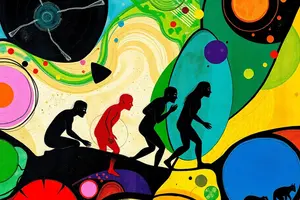Podcast
Questions and Answers
What does Cell Theory state about living organisms? Update
What does Cell Theory state about living organisms? Update
- All living organisms are composed of cells. (correct)
- All living organisms can reproduce independently.
- All living organisms are multicellular.
- All living organisms contain DNA.
Which principle explains how advantageous traits are passed on in populations over time?
Which principle explains how advantageous traits are passed on in populations over time?
- Information Storage
- Evolution by Natural Selection (correct)
- Energy Flow
- Homeostasis
Which of the following is the correct order of biological organization from smallest to largest?
Which of the following is the correct order of biological organization from smallest to largest?
- Atom, Organism, Cell, Population, Ecosystem
- Atom, Cell, Tissue, Organ, Organism (correct)
- Cell, Organism, Population, Community, Biosphere
- Molecule, Tissue, Organ, Ecosystem, Biosphere
Which branch of biology focuses on the study of heredity and variation?
Which branch of biology focuses on the study of heredity and variation?
What is the role of homeostasis in living organisms?
What is the role of homeostasis in living organisms?
Flashcards
What is biology?
What is biology?
The study of living organisms and their properties, including structure, function, growth, origin, evolution, and distribution.
What is cell theory?
What is cell theory?
A fundamental concept in biology stating that all living organisms are composed of one or more cells, which are the basic units of life. It also states that all cells arise from pre-existing cells.
What is natural selection?
What is natural selection?
The process by which organisms evolve over time through the survival and reproduction of individuals with advantageous traits. This is driven by the environment and the competition for resources.
What is homeostasis?
What is homeostasis?
Signup and view all the flashcards
What is ecology?
What is ecology?
Signup and view all the flashcards
Study Notes
Introduction to Biology
- Biology is the study of life and living organisms, including their structure, function, growth, origin, evolution, distribution, and taxonomy.
- It encompasses a vast array of disciplines, each focusing on specific aspects of life.
- Key concepts include cells, genetics, evolution, and ecology.
Core Principles of Biology
- Cell Theory: All living organisms are composed of cells, which are the basic functional units of life. Cells originate from pre-existing cells.
- Evolution by Natural Selection: Organisms evolve over time through natural selection, where advantageous traits are more likely to be passed on to future generations.
- Homeostasis: Living organisms maintain stable internal conditions (e.g., temperature, pH) despite fluctuations in the external environment.
- Energy Flow: Living organisms acquire and use energy necessary for life processes, through feeding and metabolism.
- Information Storage: Living organisms store genetic information (DNA) that dictates their traits and development.
Levels of Biological Organization
- Atoms and Molecules: The basic building blocks of matter.
- Cells: Basic functional unit of life; diverse forms (eukaryotic and prokaryotic).
- Tissues: Groups of cells with similar structure and function.
- Organs: Structures composed of different tissues working together to perform specific functions.
- Organ Systems: Groups of organs working together to achieve a common goal (e.g., circulatory system).
- Organism: An individual living entity.
- Population: A group of organisms of the same species living in the same area.
- Community: All populations of different species interacting in a particular area.
- Ecosystem: The community plus the non-living environment (abiotic factors) interacting.
- Biosphere: The total area of Earth where living organisms exist.
Branches of Biology
- Botany: The study of plants.
- Zoology: The study of animals.
- Microbiology: The study of microorganisms.
- Ecology: The study of interactions between organisms and their environment.
- Genetics: The study of heredity and variation.
- Molecular Biology: The study of biological molecules and their interactions.
- Physiology: The study of the function of organisms and their parts.
- Cell Biology: Study of cellular structure and function.
- Evolutionary Biology: Study of the processes that drive the evolution of life.
- Biochemistry: Study of the chemical processes in living organisms.
Key Biological Processes
- Metabolism: All the chemical reactions that occur in an organism.
- Reproduction: The creation of new organisms.
- Growth and Development: The increase in size and complexity of an organism.
- Response to Stimuli: Ability of organisms to react to changes in their environment.
- Adaptation: The gradual change in organisms' traits over generations enabling survival.
Biological Concepts
- Biodiversity: The variety of life on Earth at all its levels.
- Conservation Biology: The study and implementation of strategies for protecting endangered species and habitats.
- Taxonomy and Systematics: The science of classifying and naming organisms.
- Human Biology: Study of the biological processes in humans.
- Applied Biology: Use of biological principles and methods to solve problems.
Studying That Suits You
Use AI to generate personalized quizzes and flashcards to suit your learning preferences.




